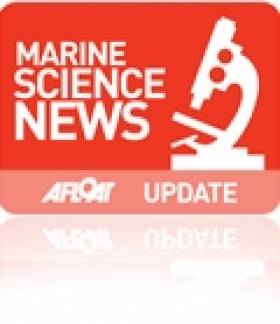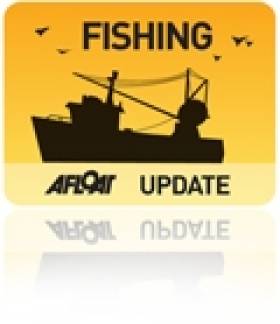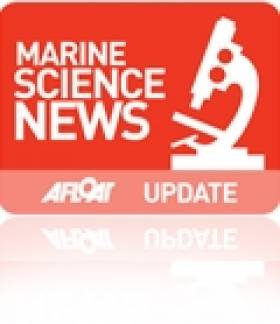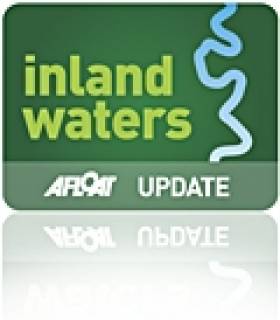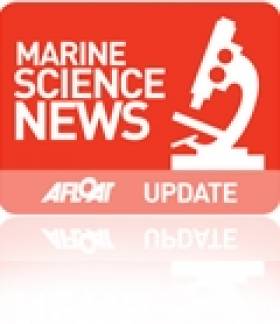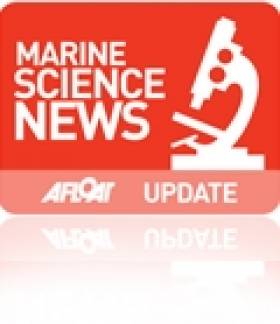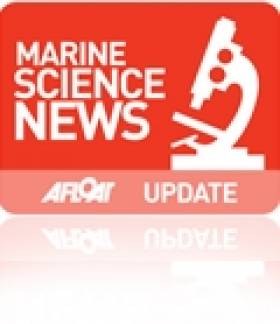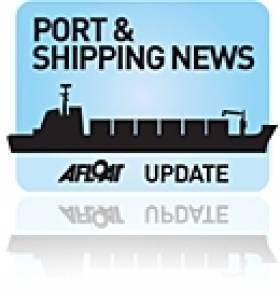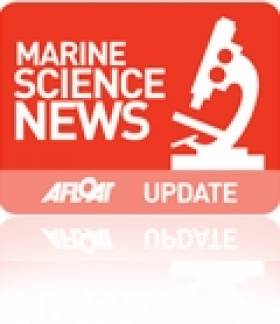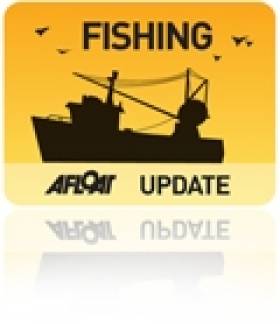Displaying items by tag: Marine Institute
EurOcean 2010 Calls for a "Blue" Future for Europe
Over 400 marine scientists and science policy makers, from across Europe, gathered at the EurOCEAN 2010 Conference (Ostend: 12-13 October) to highlight the critical role of the seas and oceans in the earth and climate system and as an important source of wealth and job creation for Europe. In calling for recognition of the Seas and Oceans as a Grand Challenge for Europe in the 21st Century, the European marine and maritime research community pledged its significant knowledge-base and specialized research infrastructures, to work in close cooperation with the public and private sector, to realize this ambitious goal.
EU Commissioner for Research, Innovation and Science Máire Geoghegan-Quinn, welcomed the Ostend Declaration "as an impetus for new ideas to boost marine research to innovate and address the challenges represented by our seas and oceans". She also pointed that "achieving the 3% target of EU GDP dedicated to research could create up to 3.7 million new jobs and €800 billion in additional GDP by 2025". "Marine and maritime research and technologies", she said "could contribute to such a process keeping in mind that "tomorrow's innovation starts with today's blue skies research."
Opening the EurOCEAN 2010 Conference, EU Commissioner for Maritime Affairs and Fisheries, Maria Damanaki, highlighted the potential of marine innovation saying that: "New growth can be Blue Growth and new jobs can be Blue Jobs. To create knowledge we need the marine community to continue making ocean measurements."
The two-day EurOCEAN 2010 Belgian-EU Presidency Conference brought together the European marine and maritime community to hear high-level speakers present a state-of-the-art overview of the exciting and innovative developments in marine and maritime research and technology which could transform the European Union into a blue economy. Topics covered included: sustainable seafood harvest, opportunities from marine biotechnology and blue energy; maritime transport and human health. Environmental and conservation challenges, such as climate change and marine biodiversity, as well as governance issues such as maritime spatial planning and the importance of international co-operation to tackle global and regional challenges were also addressed.
Dr Peter Heffernan, CEO Marine Institute and host of the EurOCEAN 2004 (Galway) Conference, in a keynote introductory address, traced the road from Galway in 2004 (Galway Declaration) to Ostend in 2010. He emphasized the various milestones and successes along the way, including the inclusion of marine science and technology as a pillar of the Integrated Maritime Policy for the Union (2007), the European Strategy for Marine and Maritime Research (2008) and the inclusion of marine science and technology as a priority cross-cutting theme in the 7th Framework Programme (2007-2013). Important lessons learned on this journey included: the need to link research priorities with current Community policies; a clear identification and quantification of the economic and societal benefits arising from marine research and the better communication of research outputs in a useful and usable format.
"Our challenge," said Dr. Heffernan, "is to move forward into the innovation space where the marine science community participates in the identification of societal changes, the anticipation of market demands and opportunities, and supports the innovation engine to be successful in commercialising such opportunities."
A second Irish speaker, Geoffrey O'Sullivan, Marine Institute - International Co-operation Programme and a Vice-chair of the Marine Board-ESF, in a presentation titled: Emerging Technologies ... Converging on the Oceans, highlighted to some of the exciting new developments and technologies emerging across the science and technology sector in renewable ocean energy, blue biotechnology, ecogenomics, nanoscience and ICT, which could and were being harnessed to support and catalyse new developments in the marine sector.
Adopting the Ostend Declaration, Lars Horn, Research Council of Norway and Chair of the Marine Board-ESF, stressed the pledge of the European marine and maritime research communities in the Ostend Declaration to work together with public and private stakeholders, and to mobilise its considerable knowledge-base and specialized infrastructures to realize the full potential health and wealth of the European seas and oceans – in other words: a Blue Future for Europe.
The Ostend EurOCEAN 2010 Conference and Declaration builds on the success of earlier Conferences in Aberdeen (2007) and Galway (2004) and was organised as a Belgian EU Presidency event in close cooperation with the European Commission and the Marine Board-ESF.
According to the latest Marine Board Vision Document, Marine Renewable Energy, Europe could source up to 50% of its electricity needs from renewable ocean energy, principally offshore wind, wave and tidal energy, by 2050. This would have a profound impact on the European economy and European citizens, contributing to energy security, reduction of CO2 emissions, improving the quality of the environment and heralding a new era of indigenous development, innovation and job creation in Europe.
The Marine Renewable Energy Vision Document was presented to Manuela Soares, European Commission, DG Research – Environment by Dr Marc Le Boulluec (Ifremer), Chair of the Vision Working Group. Mr Eoin Sweeney, representing Sustainable Energy Authority of Ireland (SEAI) and Geoffrey O'Sullivan, Marine Institute (representing the Marine Board-ESF) were members of the Marine Renewable Energy drafting group.
Introducing the latest Marine Board Position Paper Marine Biotechnology: A New Vision and Strategy for Europe, Dr Adrianna Ianora, Stazione Zooligica Anton Dohrn (Italy), noted that marine biotechnology, which involves marine bioresources, either as the source or the target of biotechnology applications, is fast becoming an important component of the global biotechnology sector. The global market for marine biotechnology products and processes is currently estimated at a conservative €2.8 billion (2010) with a cumulative annual growth rate of 4-5%. Less conservative estimates predict an annual growth in the sector of up to 10-12% in the coming years, revealing the huge potential and high expectations for further development of the Marine Biotechnology sector at a global scale.
The Marine Biotechnology Position Paper was presented by Dr Adrianna Ianora, on behalf of the Marine Board Marine Biotechnology Working Group, to Maive Rute, DG Research – Agriculture, Food, Fisheries and Biotechnology Programme. Prof Alan Dobson, Environmental Research Institute, University College Cork and acting Director of the Irish National Marine BioDiscovery Programme (NDP-Beaufort Award), was a member of the Marine Biotechnology Working Group.
The Report details €733 million (6.5% of FP7 budget 2007-2008) in EU grant-aid supporting 345 collaborative marine related projects. During this period (2007-2008), Irish marine researchers were involved in 33 collaborative projects (9.5% of total) drawing down €13.7m (1.8% of budget). To-date (October 2010), Irish marine researchers are involved in circa 65 collaborative FP7 projects drawing down over €24m in European grant-aid.
For further information on EurOCEAN 2010, including the Ostend Declaration, see: HERE
Copies of the Marine Board-ESF Marine Renewable Energy and Marine Biotechnology Reports are downloadable HERE
Fishermen Rewarded with Prestigious Marine Stewardship Certificates
Peter Whelan, Chairman of the Sea-Fisheries Protection Authority (SFPA), presented Gavin Power, Chairman of the Celtic Sea Herring Management Advisory Committee (CSHMAC) with the MSC Certification for Polyvalent Mackerel, today at the SFPA's Headquarters in Clonakilty, Co Cork.
Gavin Power of the Irish South and West Fish Producers' Organisation (IS&WFPO) and Chairman of the CSHMAC, said: "We are delighted to receive MSC Certification which is part of a structured approach towards improving the management and added value return from the polyvalent mackerel fishery. Importantly, this certification initiative represents the first such award for the Irish polyvalent sector and would not have been possible without the full support of the SFPA, the Marine Institute, the Department of Agriculture, Fisheries & Food and Bord Iascaigh Mhara.
MSC certification recognises sustainable practices in this important fishery, rewards robust governance, environmentally responsible and sustainable fishing practices and empowers consumers through the use of the label to make the best environmental choice."
Peter Whelan, Chairman of the SFPA said: "The CSHMAC's securing of the MSC's fishery certification program and seafood eco-label is significant as it recognises and rewards sustainable fishing and promotes the best environmental choice in seafood overall. Good governance and management frameworks safeguards jobs, secures fish stocks for the future and help to protect the marine environment. The MSC standard means sustainable fisheries can be recognised and rewarded in the marketplace and gives an assurance to buyers and consumers that their seafood comes from a well-managed and sustainable source."
Minister Smith said "I am delighted to sign today a new Accord on Marine Research between Newfoundland and Labrador and the Irish Authorities. The initiative involves a partnership approach between the Fisheries and Marine Institute of Memorial University of Newfoundland and Ireland's Marine Institute including the charter of the state-of-the-art research vessel 'Celtic Explorer'. Both Institutes have strong capabilities in ocean technology and research. Through this alliance, there is now an opportunity to bring the strengths of both Institutes to greater levels".
Minister of State Connick added that "The proposed EU Atlantic Strategy under the EU Integrated Maritime Policy and the support for a Joint Programming Initiative on Healthy Seas & Oceans recently announced by Ms. Máire Geoghegan-Quinn the European Commissioner for Research, Innovation and Science, highlight the increasing importance of linking the scientific challenges on both sides of the Atlantic."
Welcoming the chartering of the RV Celtic Explorer, Mr Clyde Jackman, Minister for Fisheries and Aquaculture – Newfoundland said "It will enable our academic institutions to take their already world class research to the next level and support a state of the art fishing industry that is based on better science. This initiative will create many new opportunities for young Newfoundlanders and Labradorians, as a result of a more vibrant fishing industry and in conducting fisheries science research".
"Thanks to the support of our Provincial Government, the Marine Institute of Memorial University of Newfoundland is further positioned to play a vital role in the future of fisheries in Newfoundland and Labrador. With the chartering the RV Celtic Explorer and the creation of our new Centre for Fisheries Ecosystem Research the Marine Institute is further positioned to play a vital role in fisheries science research in our province," said Glenn Blackwood, the Executive Director of the Fisheries and Marine Institute of Memorial University of Newfoundland.
"Research lead by personnel from the Centre for Fisheries Ecosystem Research and conducted aboard the RV Celtic Explorer will help develop a better understanding of the state of Newfoundland and Labrador's fish stocks and the dynamics of its marine ecosystems, providing new information to support better decisions." he said.
"The strong alliance the Marine Institute, Ireland has with the Fisheries and Marine Institute of Memorial University of Newfoundland will enable transatlantic collaboration to support the rapidly expanding fisheries research programmes in Newfoundland waters" said Dr Peter Heffernan, CEO of the Marine Institute.
"We are delighted with this opportunity to work with such a prominent team of fisheries scientists and we look forward to exploring with our Newfoundland colleagues how we can also build stronger links as part of a wider international ocean observation initiative to study the Gulf Stream and North Atlantic Drift. This could link SMART technology to monitor climate change and environmental conditions in both Irish and Newfoundland waters and stimulate commercial spin off opportunities."
"Projects linking technologies, equipment and expertise on both sides of the Atlantic would therefore enhance Ireland and Newfoundland's capability to perform in the forefront of scientific endeavours as our strategic geographic location demands," he further added.
Brendan Smith TD, Minister for Agriculture, Fisheries and Food and Sean Connick TD, Minister of State at the Department of Agriculture, Fisheries and Food signing an accord with their Newfoundland counterparts Minister Clyde Jackman and Deputy Minister Alastair O’Reilly In Agriculture House.
New Climate Model Will Chart Climate Change on Mayo Rivers
Launching the publication of the final report on RESCALE project, Minister Smith said that the project was a major milestone in our understanding of the effects of climate change on sensitive upland catchments in the west of Ireland. "While global climate change is a worldwide phenomenon, the research findings in this report provide information at the local level that will be invaluable to fisheries and land use managers," said the Minister. "Practical research work such as RESCALE is essential if we are to plan for the future management of our valuable agriculture, fisheries and forestry resources in the west of Ireland."
The project is studying data from an unbroken record of information on water temperature, air temperature, river discharge, rainfall and a host of other factors which exists for the catchment dating back to the 1950s for the Burrishoole river. This information collected at the Furnace facility and the neighbouring Met Eireann synoptic station, is invaluable as a resource, not only for measuring physical change over the past sixty years, but also as a proven yardstick to "ground-truth" any computer-generated models describing the likely effects of global warming. Minister Smith said "I am very impressed with the work being done here in Newport and the high level of collaboration between the Institute and the Universities on marine research and its practical application to real situations to help inform decision making into the future."
Europe Seeks Public Input on Atlantic Ocean
The European Commission invites on-line public input to explore how the Integrated Maritime Policy (IMP: 2007) could be implemented in the European Atlantic Area.
In the context of the IMP-2007, the Commission is developing strategic approaches to Regional Sea Basins where there is a demand and a perspective of clear value added. Regional (Sea Basin) Strategies have been completed for the Baltic Sea, the Arctic, the Mediterranean and are at a planning stage for the North Sea.
The Commission now invites interested parties in the Atlantic region to input to the development of an Atlantic Strategy.
Such a Strategy would define common priorities; improve regional governance; identify opportunities for smart economic growth and for clustering, synergies and economics of scale. A Regional Strategy would also better focus future European Funding Programmes (e.g. Structural, Regional, Research, Innovation & Competitiveness, etc).
Target Groups: Member States, regional and local authorities, inter-governmental and non-governmental bodies, public organisations, enterprises, civil society and the general public
Contributions may be submitted by using an online questionnaire.
http://ec.europa.eu/fisheries/partners/consultations/atlantic_ocean/index_en.htm
State Research Body Backs Call for Marine Protected Areas
Speaking from the launch of the report in Bergen, Norway, Minister of State with responsibility for Sustainable Transport, Horticulture, Planning and Heritage, Mr. Ciaran Cuffe T.D. said that Ireland welcomed this evidence-based assessment of the marine environment as a 'major milestone.'
"Such periodic holistic assessments are essential 'barometers' allowing policy makers to gauge overall progress towards sustainable management and identify those actions essential to deliver clean, diverse, healthy and productive seas around us," said Minister Cuffe. "Such actions are critical to maintaining our seas and oceans as a sustainable resource for this and future generations."
According to the Report, climate change and ocean acidification effects are now evident especially in the northern OSPAR areas. In addition, human uses of the marine environment, such as offshore renewable energy, offshore oil and gas production, mineral extraction and shipping, are increasing and must be managed in a coordinated way, backed up by research on impacts, if environmental damage is to be avoided.
Furthermore, the decline in biodiversity is far from being halted and actions, such as extending the network of offshore Marine Protected Areas (MPAs), are required to improve the protection of threatened and/or declining species and habitats. In December 2009 Ireland designated 19 MPAs including 4 offshore MPAs.
However, the Report states that there has been progress in reducing pollution from nutrients, certain hazardous substances and radioactive substances in our oceans and seas, although continued efforts are needed. In addition, there have been improvements in fisheries management, although fishing activities continue to have large impacts on marine ecosystems in the seas around Ireland.
"The Marine Institute is delighted to have participated closely in the development and production of this assessment by acting as the focal point for Irish involvement in the process and by providing data and scientific input," said Dr. Peter Heffernan, CEO of the Marine Institute. The QSR 2010 Report is a product of cooperation between many experts from 15 OSPAR countries. The Department of Environment, Health and Local Government act as Head of Delegation for Ireland to OSPAR.
Irish Marine Researchers Invited to Comment on European Marine Research
Irish marine researchers (including SMEs) are invited to comment and / or give input to future European Marine Research Strategy via the draft Ostend Declaration.
The EurOCEAN 2010 Ostend Declaration will be a key deliverable of the Belgian-EU Presidency EurOCEAN 2010 Conference (Ostend 12th – 13th October). The Ostend Declaration, following the success of the Galway Declaration (2004) and the Aberdeen Declaration (2007), is intended to highlight the importance of marine and maritime science and technology for our economies and societies and to identify the high level governance structures, support mechanisms and research infrastructures necessary to ensure that critical research challenges in the next decade are properly addressed at national and European level.
In consultation with key European marine and maritime science stakeholder organisations and networks, a drafting group has prepared a draft Ostend Declaration which will be open for consultation until 4th October 2010. The Declaration aims to raise the profile of marine science and technology in Europe and needs your support.
The draft Ostend Declaration will be presented and discussed for approval at the EurOCEAN 2010 Conference on 12th – 13th October 2010 (www.eurocean2010.eu) which will be attended by Commissioner Damanaki (DG MARE) and Commissioner Geoghegan-Quinn (DG Research).
Irish Shipping Trade Volumes Return to Growth
The midyear data in particular points towards trade volume growth in three of the principal freight segments; most significantly in lift-on/ lift-off (lo/lo) export trades which we estimate grew by 5%. Roll-on/Roll-off export traffic was also up 5% per cent on an all island basis. Dry bulk volumes through ROI ports increased by 15% for the first six months compared to the same period last year. Shipments in April this year saw the strongest monthly volume of bulk cargoes in over 2 years.
Roll-on/roll-off (ro/ro) traffic on an all-Island basis continued to make a steady recovery with an increase of 2%, up to 771,585units for the first half of 2010. The ro/ro segment is largely weighted towards services to and from the UK which remains our largest trading partner.
The most significant change in volume has been in the main lo/lo trades. Overall total volume including export and imports fell only marginally by 1% to June with 517,552 units being handled. However this compares to a -24% reduction for the same periods last year.
A key factor in the positive upward movement has been the continued strong performance of export volumes which as noted was up 5% year on year. Import volumes were down 2% which is largely as a result of continued weak domestic demand. Nonetheless the rate of decline in import volumes has eased sharply which is possibly also offset by demand for industrial imports used as inputs for the merchandise export trades.
The sharp fall in import units over the last 24 months has inversely created a problem for export companies as there is now reduced supply of export quality containers available in Ireland. As a result shipping lines have to reposition empty containers from the UK and Continent which in turn adds to the overall cost of the export box.
Dry bulk (Bulk carrier) trades recovered some of the record volume losses seen in 2009 with a strong 15% increase between January and June. Part of this recovery is attributed to stronger domestic demand for grains, fertilizers and other agricultural products, while improved global demand for steel and other ore aggregates also pushed up volume throughput.
Breakbulk volumes through ROI ports linked to construction inventories such as steel and timber continued to decline by 11%, which is half the recorded figure for 2009. Nonetheless volume activity in this segment remains at a historically low level.
Liquid bulk (Tanker) volumes such as oil fell by 4%, with lower transshipment storage for the US market and other seasonal factors impacting on demand. The outlook for continued short term volume recovery remains largely contingent on the external recovery in the global economy.
Students Take to the High Seas
Imagine being able to plan, design and carry out your own scientific survey into the seas around us. Last week research students from across Europe were given just such an opportunity when they joined scientists onboard the Irish national research vessel RV Celtic Voyager in waters off Cork.
This unique opportunity for students to gain practical experience in carrying out multidisciplinary marine scientific research is part of the European Framework 7 project EUROFLEETS, and was designed, developed and co-funded by the Marine Institute, Ireland.
Over the course of six days, between the 14th and 19th August, 20 European postgraduate students learned the skills necessary to map the seabed, identify the animals and plants living there, and investigate the local and oceanic currents that influence them. Training focused specifically on operational research and included the deployment of equipment and instrumentation, sample recovery and processing, and data acquisition. Other modules investigated designing and planning a survey, operations and capabilities of research vessels and safety at sea.
Former Obama Adviser sees a "Rebirth" in the Use of Industry Information to Guide Scientists
Dr. Peter Heffernan (Marine Institute) with Martin Pastoors (IMARES, The Netherlands) and Dr. Steve Murawski (NOAA, USA) at the Conference. (Photo: Marine Institute).
The Conference - "Fisheries Independent Information, Galway 2010" – not only explores how information gathered at sea by fishermen can better contribute to fish stock assessments, management and policy but critically, how the vast amount of experience and traditional knowledge accumulated by the fishing industry can be harnessed in sustainable management strategies.
Speaking on the first day of the event Dr. Steve Morawski, former senior advisor for the National Oceanic and Atmospheric Administration to President Obama's Ocean Policy Task Force and the current Chief Science Advisor to NOAA Fisheries, USA said that in spite of past concerns regarding the reliability of fishery-dependent data, we are in the midst of a "rebirth" in the use of information from industry to inform stock assessment and the management of catch and by-catch allowances.
"Fortunately, great advances have been made in methods for collection and analysis of fishery-dependent data and we have experienced encouraging success in working with stakeholders to collect this type of data," he said.
Some 30 countries from across the globe are represented at the conference, which features 81 oral presentations and 50 poster displays covering the entire spectrum of fishing, from small scale artisinal fisheries right up to large scale industrial operations engaged across the world's oceans and inland waters.
Opening the conference, Dr. Peter Heffernan of the Marine Institute said that, while Ireland had made significant progress in bringing scientists and fishers together through the formation of the Irish Fisheries Science Partnership, he was keen to learn how such initiatives had worked elsewhere and what we could learn from others. "Innovation is the key element to this conference," he said, "technical innovation in the development of new data collection tools and data integration, but also through innovative thinking and co-operation in how we can marry together traditional and non-traditional information."
According to the International Labour Organisation (ILO) the capture fishing industry employs some 27 million people worldwide (including full-time, part-time and occasional fishers). In Europe, the European Commission estimates that some 141,000 people are employed in the fishing sector which produces over 6.5 million tonnes of fish between the catching and aquaculture industries.
"Fishermen and scientists have an enormous amount that they can contribute to each other," said Lorcan O'Cinneide, CEO of the Irish Fish Producers Organisation in his keynote address earlier today (Tuesday 24th August). "It is essential for the future that the integration of such information can be brought to the centre of the scientific and advice process in a manner that has the necessary rigour to be credible and useful to analysis."
Marine and inland fisheries are of particular importance to developing countries where ILO estimates that over 94% of the world's fishers live (Asia 83%, Africa 9% and South America 2.5%). In these countries fish is not only an important source of protein for many communities, but also an important part of global trade. The role that fishers and their knowledge play in ensuring a sustainable "ecosystem approach" to commercial fishing by artisinal and small-scale fishworkers the world over will be discussed during the last day of the Conference (Thursday 26th) by Sebastian Mathew of the International Collective in Support of Fishworkers (ICSF).
The conclusion of his paper will suggest that sustainability in fisheries depends upon seeking common ground between fisheries policy, scientific knowledge and fishers' knowledge and practice. He will also suggest that the key to sustainable fisheries management lies in treating fishers' knowledge with respect and by promoting active communication amongst stakeholders.


























